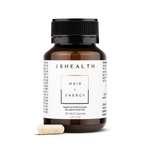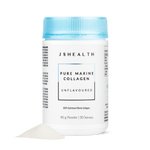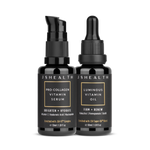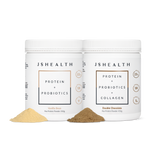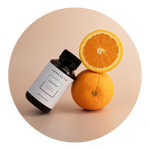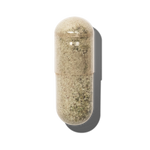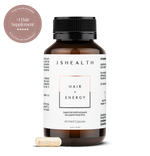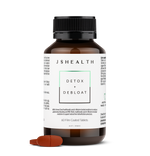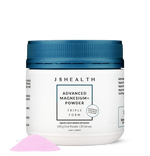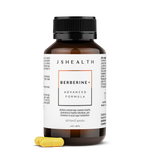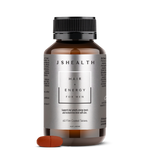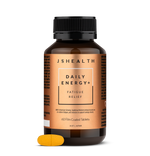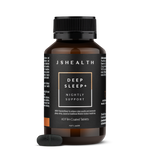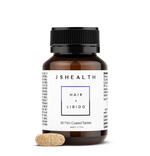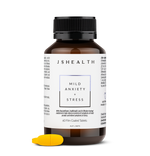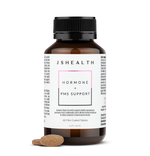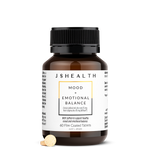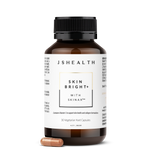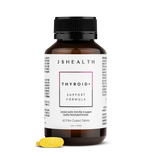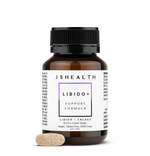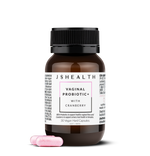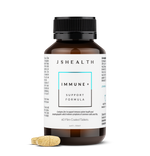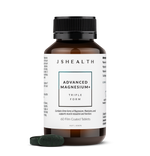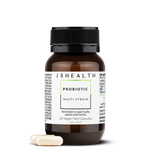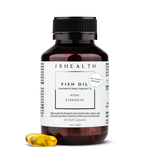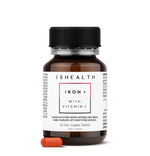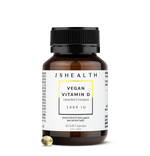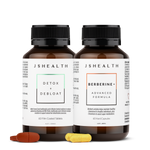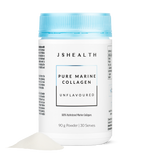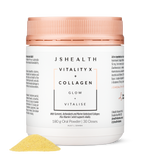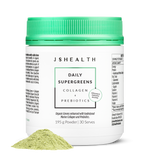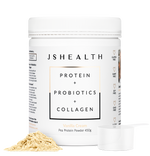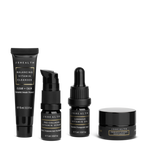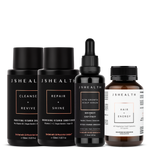4 Ingredients To Support Mental Wellbeing
Ever heard of the saying ‘good food, good mood’?
The relationship between mood and food is undeniable! It’s underpinned by complex biochemical interactions involving neurotransmitters, hormones and gut microbiota.
So much science points to the ability of nutrient-rich foods to positively influence the synthesis of neurotransmitters (serotonin and dopamine), which are critical for our mood regulation - in turn, enhancing our mood (1). Some studies show that foods high in omega-3 fatty acids (fatty fish) and those rich in antioxidants (fruits and vegetables) have been shown to enhance cognitive function and reduce symptoms of depression (2)!
The gut-brain axis is a core component of the link between food and mood. We now know how crucial gut health is when it comes to emotional wellbeing - a balanced microbiome can produce short-chain fatty acids and other metabolites that affect brain function (3). Conversely, diets high in processed sugars and unhealthy fats can lead to inflammation and oxidative stress, potentially wreaking havoc on our gut microbiome and exacerbating mood disorders.
The best approach is to aim for a diet high in essential macronutrients with good-quality proteins, complex carbohydrates, plenty of fibre and omega-3 fatty acids. This variety and quality of nutrients can balance blood sugar levels, support gut health and promote stable moods throughout the day.
Our top four nutrients for mood are:
1. Fish Oil
Fish oil is rich in omega-3 fatty acids, particularly EPA and DHA, which have been shown to support brain health and improve mood.
These essential fatty acids play a crucial role in the structure and function of neuronal membranes and are involved in the synthesis of neurotransmitters like serotonin and dopamine, which are vital for emotional regulation (4).
Research suggests that regular consumption of fish oil may reduce symptoms of depression and anxiety, by promoting overall brain health and reducing inflammation (5).
Dietary Sources:
- Fatty fish like salmon, mackerel, sardines or trout
- High quality fish oil supplements
- Certain fish-oil fortified foods
2. Saffron
Saffron is derived from the flower of Crocus sativus and has garnered attention for its potential mood-enhancing properties, known colloquially as ‘sunny saffron’.
Several studies suggest that saffron may be effective in alleviating symptoms of depression and anxiety, likely due to its ability to influence neurotransmitter levels, particularly serotonin (6).
The bioactive compounds in saffron, (crocin and safranal), exhibit antioxidant and anti-inflammatory effects that may further support mental health. By modulating mood-related pathways in the brain, saffron can contribute to an improved emotional state - making it a promising natural remedy for enhancing mood!
Dietary Sources:
- Saffron threads (used as a spice in cooking)
- High quality saffron extract (available in supplement form)
- Herbal teas that include saffron
3. Magnesium
Magnesium, also known as the ‘magic mineral’ is an essential mineral that plays a pivotal role in over 300 biochemical processes in the body - namely muscle function, nervous system function and those that regulate mood and emotional wellbeing (7).
Studies have shown that adequate magnesium levels are associated with a reduced risk of depression and anxiety, due to its effect supporting and soothing nervous system function. Some studies show that magnesium deficiency can lead to increased cortisol levels and heightened stress responses! (8).
Magnesium further supports brain health by promoting neuroplasticity and reducing inflammation, in turn - contributing towards a more balanced mood.
Dietary Sources:
- Leafy green vegetables like spinach and kale
- Nuts and seeds: almonds, pumpkin seeds, cashews
- Whole grains such as brown rice, quinoa or oats)
- Legumes like black beans and lentils
- Dark chocolate (at least 70% cacao)
- Supplement form (look for those with multiple forms of bioavailable magnesium at quality doses)
4. Ashwagandha
Ashwagandha is an adaptogenic herb and has been used for centuries in Ayurvedic medicine to help the body adapt to stress and promote overall wellbeing.
Research indicates that ashwagandha may reduce cortisol levels (the hormone associated with stress) enhancing the body's ability to cope with anxiety (9).
It’s bioactive compounds (withanolides), are believed to modulate neurotransmitter activity and promote a sense of calm and stability. Additionally, ashwagandha may improve sleep quality and cognitive function, further supporting emotional balance (9). A truly powerful, mood-loving herb!
Dietary Sources:
- Ashwagandha root powder (used in smoothies, teas or cooking)
- Ashwagandha capsules or tablets (available as supplements)
- Ashwagandha-infused herbal blends or teas
- Some health food products (chocolate) that include ashwagandha as an ingredient
References
- Lachance, L., Ramsey, D. Food, mood, and brain health: implications for the modern clinician. Mo Med. (2015) Vol 112(2), pp. 111-5. PMID: 25958655.
- Mehdi, S., Manohar, K, Shariff, A., Kinattingal, N., Wani, SUD, Alshehri, S., Imam, M.T., Shakeel, F., Krishna, K.L. Omega-3 Fatty Acids Supplementation in the Treatment of Depression: An Observational Study. J Pers Med. (2023), Vol 13(2), p. 224. PMID: 36836458.
- Simpson, C.A., Diaz-Arteche, C., Eliby, D., Schwartz, O.S., Simmons, J.G., Cowan CSM. The gut microbiota in anxiety and depression - A systematic review. Clin Psychol Rev. (2021) Vol 83. PMID: 33271426.
- DiNicolantonio, J,J., O'Keefe, J.H. The Importance of Marine Omega-3s for Brain Development and the Prevention and Treatment of Behavior, Mood, and Other Brain Disorders. Nutrients. (2020), Vol 12(8), p. 2333. PMID: 32759851.
- Shafiee, A., Jafarabady, K., Seighali, N., Mohammadi, I., Rajai Firouz Abadi, S., Abhari, F.S., Bakhtiyari, M. Effect of Saffron Versus Selective Serotonin Reuptake Inhibitors (SSRIs) in Treatment of Depression and Anxiety: A Meta-analysis of Randomized Controlled Trials. Nutr Rev. (2024), PMID: 38913392.
- Fiorentini, D, Cappadone, C., Farruggia, G., Prata, C. Magnesium: Biochemistry, Nutrition, Detection, and Social Impact of Diseases Linked to Its Deficiency. Nutrients. (2021) Vol 13(4), p. 1136. PMID: 33808247.
- Pickering, G., Mazur, A., Trousselard, M., Bienkowski, P., Yaltsewa N, Amessou, M., Noah, L., Pouteau E. Magnesium Status and Stress: The Vicious Circle Concept Revisited. Nutrients. (2020) Vol 12(12), p. 3672. PMID:
- Majeed, M., Nagabhushanam, K., Mundkur, L. A standardized Ashwagandha root extract alleviates stress, anxiety, and improves quality of life in healthy adults by modulating stress hormones: Results from a randomized, double-blind, placebo-controlled study. Medicine (Baltimore). (2023), Vol 102(41). PMID: 37832082.
- Deshpande, A., Irani, N., Balkrishnan, R., Benny, I.R. A randomized, double blind, placebo controlled study to evaluate the effects of ashwagandha (Withania somnifera) extract on sleep quality in healthy adults. Sleep Med. (2020), Vol 72, pp. 28-36. PMID: 32540634.
